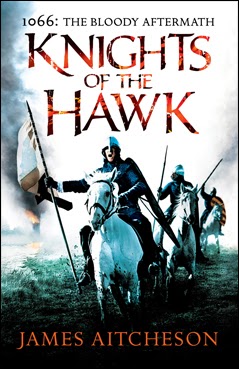Sworn Sword~~by James Aitcheson
Marsha writes, "I picked Paula's review of Sworn Sword because the review inspired me to purchase the book which I enjoyed immensely. I love the Conquest time frame and was happy to have a new author to explore. I am looking forward to purchasing the rest of the series."
Paula's People with Simon Stirling
"I picked Paula's piece with Simon about Shakespeare because it was so interesting and I am fascinated by Simon's ideas. I would really like to delve more into Shakespeare's life and plan on purchasing Simon's book."
Thanks to Simon for coming along and being a guest on Paula's People. Simon discusses the ideas that spawned his latest novel Who Killed William Shakespeare?
I was chatting to (chatting up?) a Canadian student at my drama school in London, one day.
“So – got anything planned for this weekend?”
“Yeah, we’re all going up to Stratford-upon-Avon. We’re seeing a show at the Royal Shakespeare Theatre, and we get the Shakespeare tour.”
Marsha writes, "I picked Paula's review of Sworn Sword because the review inspired me to purchase the book which I enjoyed immensely. I love the Conquest time frame and was happy to have a new author to explore. I am looking forward to purchasing the rest of the series."
Sworn Sword sweeps us into the 11thc just as the English are on the rise after their devastating defeat at Hastings just over two years before. From the outset we are thrust into a world of where life depends on who wins the battles. Bloodshed and loss is now a way of life for most people since William of Normandy clawed the English crown from the head of the usurper’, Harold Godwinson.
With the opening focusing on an English uprising in the streets of Dunholm, strong hold of Robert de Commines, Lord of the North, we meet our protagonist, Tancred, a Breton, commanding his own conroi. Tancred and his comrades have been trying to fight off the attack when Tancred hears that his beloved Oswynn Is murdered by the marauders; but there is no time to grieve, for he must save his lord, Robert, set upon with his men in the mead hall. Tancred leads his conroi to the rescue but they are too late and Lord Robert is burned alive with his comrades inside the blazing hall. The Normans are slaughtered almost to a man, but Tancred, who has been badly injured, is carried by his surviving friends Eudo and Wace to the relative safety of York. There the trio find refuge in the house of Robert’s vicomte, Guillaume (William) Malet.
Tancred spends some time under the care of Malet’s priest, Aelfwold who tends his patient’s wounds and saves him from developing a life threatening infection. When he is well, Malet gives the now lordless knight an ultimatum: owe him a debt for the succour and hospitality he had provided him with, or carry out a mission that would set him free of any obligation owed. Reluctantly, he accepts, for he would rather stay behind in York to exact revenge upon the English who killed his lord and his woman Oswynn. But little did he realise when he gave his oath to Malet, that he would become embroiled in a secret that holds the fate of the kingdom in the balance...
I approached this novel with caution, a) because I am a die-hard Anglo-Saxon supporter and b) because the Normans did terrible things to the English during the invasion, so when I realised this was going to be a story told from the point of view of one of the invaders, I was unsure as to whether or not I was going to enjoy it. It’s not that I am so narrow minded I can’t enjoy a book from any other viewpoint other than the English one, it is that I didn’t want to read something that promoted the Norman invasion as a good thing and that William was a good guy fighting for his rights, and by the shedding of much English blood, winds up on the English throne. Although Tancred fought on the Conqueror’s side at the Battle of Hastings, he views the English with suspicion and believes that the rightful King now sits on the throne, this is a book that tells the story of one man’s journey to find a new purpose to his life, now that his beloved lord is no longer in the world.
What I liked about James Aitcheson’s portrayal of an England in the aftermath of Hastings, is that it shows the reader how the scene would have looked to just such a man, especially as it is written in the first person, without making it heavily pro-Norman or pro- English. Although the latter are seen as pretty much the bad guys in a way, and the former as the righteous, it’s understandable, because we are seeing it from Tancred’s point of view and as far as he is concerned, he and his comrades are vindicated, for they represent loyal supporters of the rightful King, assisting him in keeping the peace in his new kingdom that was bequeathed to him, quite honourably by his cousin Edward, and stolen from him by the usurper Harold Godwinson. Presented as thus, I found it easy to glide into the story from the start.
Paula's People with Simon Stirling
"I picked Paula's piece with Simon about Shakespeare because it was so interesting and I am fascinated by Simon's ideas. I would really like to delve more into Shakespeare's life and plan on purchasing Simon's book."
*********
Thanks to Simon for coming along and being a guest on Paula's People. Simon discusses the ideas that spawned his latest novel Who Killed William Shakespeare?
I was chatting to (chatting up?) a Canadian student at my drama school in London, one day.
“So – got anything planned for this weekend?”
“Yeah, we’re all going up to Stratford-upon-Avon. We’re seeing a show at the Royal Shakespeare Theatre, and we get the Shakespeare tour.”
It was part of the one-year course for overseas students: the Stratford Weekend. And that’s when it struck me. To lovers of theatre, and literature, all over the world, Stratford is a kind of Mecca.
And there was me thinking it was a place you went to on a Sunday afternoon.
I’ve spent a great deal of my life in and around Shakespeare’s hometown. It’s given me a different perspective on the ‘Sweet swan of Avon’. Time after time, reading biographies of William Shakespeare, I was struck by how little interest the biographer had in Shakespeare’s native region, his family connections, the knotty network of friends and co-religionists which made Warwickshire such a tribal county.
London has changed since Shakespeare’s day. But much of his home county hasn’t altered that much. You can get closer to Shakespeare in the lanes around Baddesley Clinton or Earls Common than you ever can on the banks of the Thames.
When I started studying Shakespeare in the late-1980s, hoping to understand how a lad from the Midlands became the world’s greatest poet-playwright, I found it all a frustrating experience. “We know so little about him!” seemed to be the cry on every Shakespeare scholar’s lips. Twenty-five years on, I’ve come to believe that this mantra is anything but true. By refusing to concentrate on his London days, I was able to uncover several new facts about Shakespeare’s life. A whole new picture emerged – more ‘real’, if you will, and certainly more intriguing. Downright scary, at times.
But the mythology of Shakespeare forms most of what we know, or think we know, or are told to think we know, about this brilliant man. To engage properly with Shakespeare is to enter the terrifying world of Tudor and Jacobean politics, something unnervingly close to a police state, and the sheer brutality of the repression of those who adhered to the Catholic faith, as their forefathers had done for a thousand years. It is to enter a period of great upheaval, a massive redistribution of wealth, the remorseless rise of a new political class and a casual recourse to murderous violence. It was a time of fear and favour, of propaganda and prejudice.
And there was me thinking it was a place you went to on a Sunday afternoon.
I’ve spent a great deal of my life in and around Shakespeare’s hometown. It’s given me a different perspective on the ‘Sweet swan of Avon’. Time after time, reading biographies of William Shakespeare, I was struck by how little interest the biographer had in Shakespeare’s native region, his family connections, the knotty network of friends and co-religionists which made Warwickshire such a tribal county.
London has changed since Shakespeare’s day. But much of his home county hasn’t altered that much. You can get closer to Shakespeare in the lanes around Baddesley Clinton or Earls Common than you ever can on the banks of the Thames.
When I started studying Shakespeare in the late-1980s, hoping to understand how a lad from the Midlands became the world’s greatest poet-playwright, I found it all a frustrating experience. “We know so little about him!” seemed to be the cry on every Shakespeare scholar’s lips. Twenty-five years on, I’ve come to believe that this mantra is anything but true. By refusing to concentrate on his London days, I was able to uncover several new facts about Shakespeare’s life. A whole new picture emerged – more ‘real’, if you will, and certainly more intriguing. Downright scary, at times.
But the mythology of Shakespeare forms most of what we know, or think we know, or are told to think we know, about this brilliant man. To engage properly with Shakespeare is to enter the terrifying world of Tudor and Jacobean politics, something unnervingly close to a police state, and the sheer brutality of the repression of those who adhered to the Catholic faith, as their forefathers had done for a thousand years. It is to enter a period of great upheaval, a massive redistribution of wealth, the remorseless rise of a new political class and a casual recourse to murderous violence. It was a time of fear and favour, of propaganda and prejudice.
Click to continue reading...













